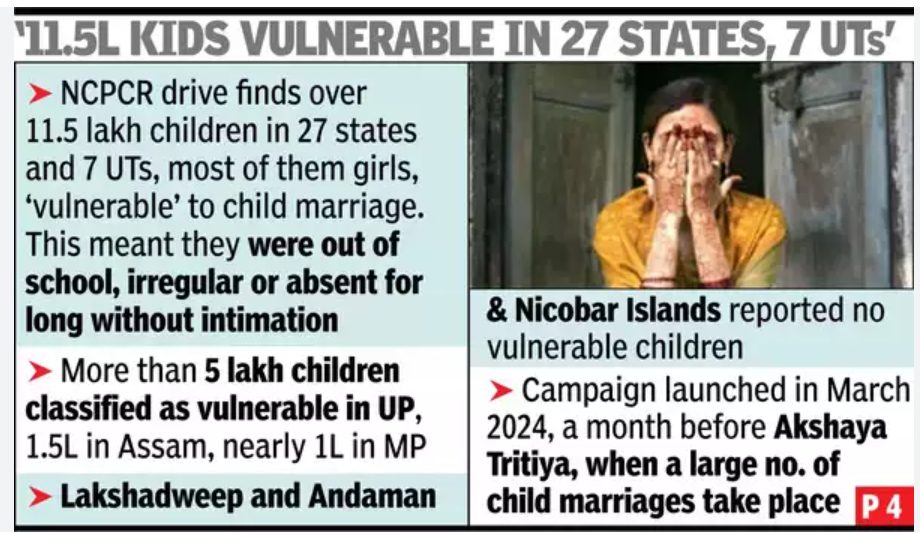Supreme Court Urges Parliament to Ban Child Betrothals, Calls for Comprehensive Measures to Combat Child Marriage
(Source: Indian Express; Section: Express Network; Page: 07)
| Topic: GS2 – Social Justice |
| Context: |
|
Analysis of News:

The Prohibition of Child Marriage Act, 2006
- The law seeks to prevent child marriages by making certain actions punishable and by appointing certain authorities responsible for the prevention and prohibition of child marriages.
- Definitions under the Act
-
- “Child” means a person who, if a male, has not completed twenty-one years of age, and if a female, has not completed eighteen years of age.
-
- “Child marriage” means a marriage to which either of the contracting parties is a child.
-
- “Minor” means a person who has not attained his majority under the provisions of the Majority Act, 1875. As per the Majority Act, 1875, every person domiciled in India attain the age of majority on his completing the age of eighteen years.
- Child marriage is an offence punishable with rigorous imprisonment, which may extend to 2 years, or with fine up to Rs.1 Lakh, or both. The offences under the Act are cognisable and non-bailable.
- Persons who can be punished under the Law include
-
- Whoever performs, conducts or directs or abets any child marriage.
-
- A male adult above 18 years marrying a child (Section 9).
-
- Any person having charge of the child, including – parent or guardian, any member of an organisation or association, promoting, permitting, participating in a child marriage.
Supreme Court’s Stance on Child Betrothal
- The Supreme Court of India has urged Parliament to consider banning child betrothals by amending the Prohibition of Child Marriage Act (PCMA), 2006.
- The court highlighted that child marriages violate a minor’s right to free choice, autonomy, and childhood, stressing that betrothals in childhood deprive minors of their ability to make informed decisions about their life and partner.
International Law and Child Marriage
- The court referenced international law, particularly the Convention on the Elimination of All Forms of Discrimination Against Women (CEDAW), which opposes child betrothals.
- It emphasized the need for targeted remedies to eliminate the practice, as child betrothals are often used to evade legal penalties under the PCMA.
Interface Between Personal Laws and PCMA
- The court addressed the conflict between personal laws and the PCMA. The Union Government had requested that the PCMA be given precedence over personal laws.
- The court noted that the Prohibition of Child Marriage (Amendment) Bill, 2021, seeks to clarify this and is currently under consideration in Parliament.
Social and Economic Impact of Child Marriages
- The Supreme Court highlighted the adverse effects of child marriages on both boys and girls.
- Early marriages deprive girls of their childhood and isolate them socially, while boys are burdened with adult responsibilities prematurely.
- Although the prevalence of child marriage in India has decreased since the enactment of the PCMA, gaps remain in implementing targeted measures for prevention.
Need for a Comprehensive Approach
- The court pointed out that existing government schemes, while impactful, are not sufficient to tackle child marriage comprehensively.
- A multifaceted approach, including training, awareness programs, and financial incentives, is essential.
- The court stressed that without direct economic support, families in financial hardship may still resort to early marriages, limiting the effectiveness of these programs.
| What are the Major Factors Associated with Child Marriage? |
Economic Factors: Families living in poverty might see marriage as a means to reduce the economic burden by transferring responsibility for the girl to her husband’s family.
Social Norms and Traditional Practices: Long-held customs and traditions often prioritize early marriage as a social norm, perpetuating the practice across generations.
Gender Inequality and Discrimination: Unequal power dynamics and limited agency for girls compared to boys contribute significantly to early marriage.
|
| Practice Question: Critically analyze the legal, social, and economic implications of child marriages in India. How can amendments to the Prohibition of Child Marriage Act (PCMA) and targeted government measures help in effectively combating this issue? (250 words/15 m) |

